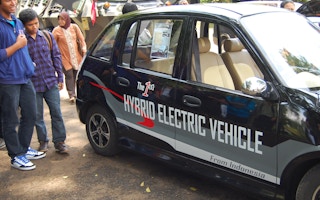Indonesia has been ramping up its electric vehicle industry through a series of investments, but there is a lingering question over whether these efforts are enough.
Growth in the EV market has so far been bumpy though exciting, helped by steady investment from the Asean region since 2019. EVs are expected to have a market share of US$20 billion by 2030.
Tax incentives have had a fairly limited impact. And while there is a growing demand for EVs, the lack of supportive infrastructure is a significant roadblock.
Similar to the rest of the world, ‘range anxiety’ – the concerns about how far an EV can travel on a single charge and the consequent fear of being left stranded during a journey – is a major concern in Indonesia.
There are not enough public charging stations and the National Electricity Company, whose job it is to supply them, has been struggling to fulfill demand.
It isn’t helped by higher charging costs relative to home charging.
Consumers, however, are reluctant to install chargers at home because of its prohibitive cost. To install a charger means increasing electricity supply to a dwelling, adding more to the upfront cost of buying an EV.
In a bid to get more public charging stations, the National Electricity Company has opened public-private partnership opportunities in the creation of charging stations with an investment value of 342,000,000 rupiah (US$21,859) per station.
The Ministry of Energy on Mineral Regulation and Mineral Development has set a maximum value to service costs to ensure consumer affordability of electric charging, by imposing maximum service costs of Rp25,000 (US$1.60) for fast charging facilities and Rp57,000 (US$3.64) for ultra-fast charging facilities.
In 2023, the Ministry of Finance Regulation set a Value-Added Tax (VAT) of 11 per cent on EVs, the bulk of which – 10 percent – is met by the government. That means consumers pay just 1 per cent.
At the same time, it ruled that only EVs with a specific amount of the Local Content Requirement could apply for the incentives. Four-wheeled vehicles and buses are required to have local content requirements between 20 to 40 per cent.
These incentives follow from a 2019 move to lower the luxury goods sales tax on electric and hybrid vehicles relative to combustion engines.
Both of these moves have sparked more interest in EVs and there has been an increase in sales in 2023.
One lingering issue for Indonesia’s EV strategy is where the power comes from to keep them on the road.
Coal-fired power plants make up 43 per cent of Indonesia’s primary energy supply for electricity. The adoption of electric vehicles would not be more environmentally friendly as the electricity is still being generated by fossil fuels.
But the government is committed to phasing out coal.
The National Energy Policy has set coal to a minimum of 30 per cent in 2025 and a minimum of 25 per cent in 2050 with an increase of renewable energy contribution to a minimum of 23 per cent in 2025 and 31 percent in 2050.
The expectation is that renewables would replace coal in electricity generation over time.
For now though, more incentives might be the way to build the much-needed infrastructure Indonesia needs for greater EV use.
Under current regulations, it seems that a lack of incentives for businesses to partner with the National Electricity Company means they bears a huge financial and technical burden in building charging stations.
The question of who pays and how will need to be answered as Indonesia transitions from coal to renewables and encourages drivers to go electric.
Mailinda Eka Yuniza is associate professor at the Administrative law Department, Faculty of Law and researcher at the Center for Energy Study Universitas Gadjah Mada, Yogyakarta, Indonesia.
Jonathan Abram Dewanto is a legal research assistant at Gadjah Mada University Faculty of Law.
Originally published under Creative Commons by 360info™.



















